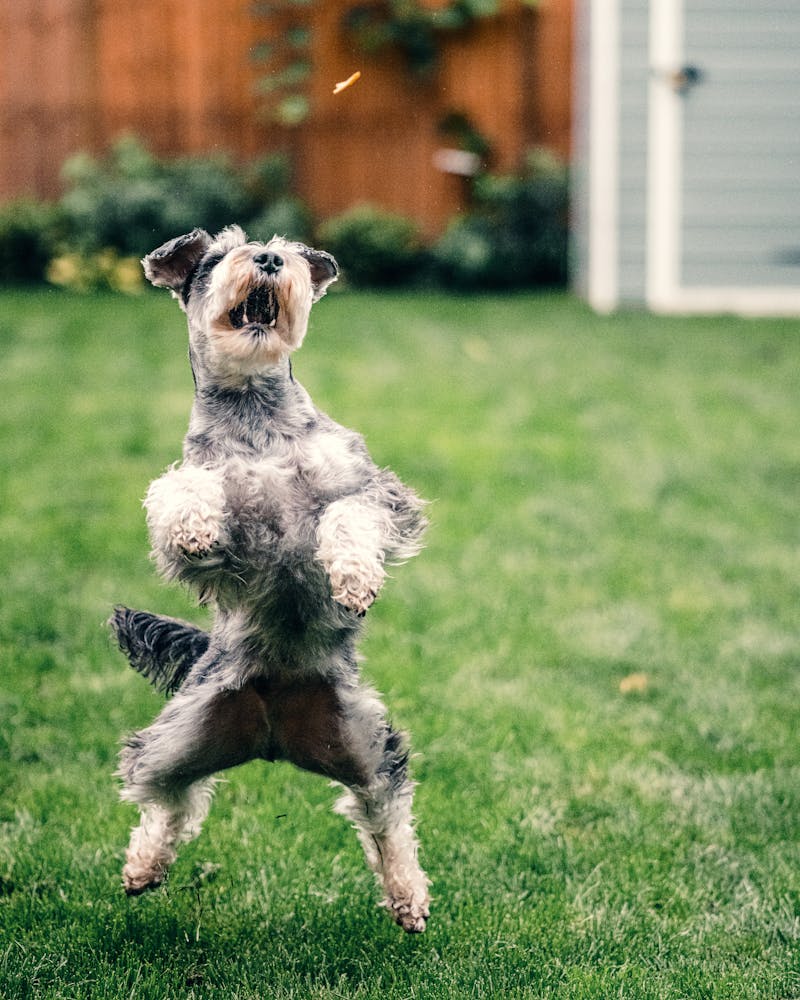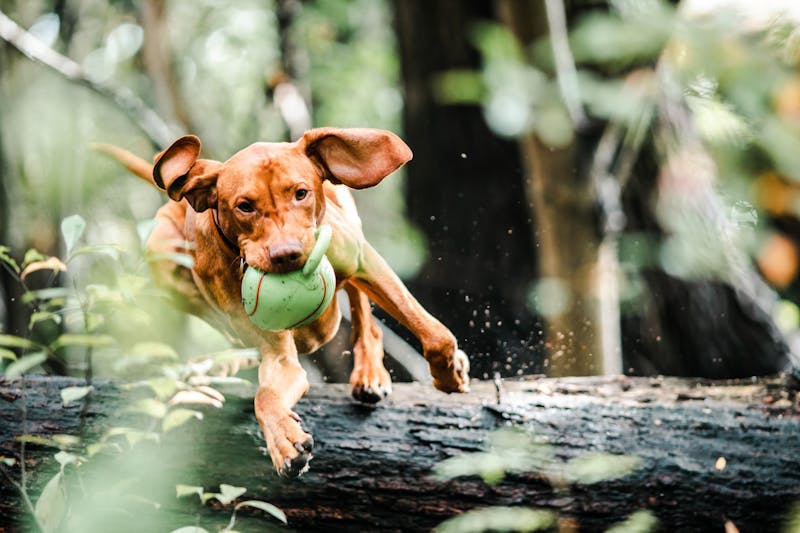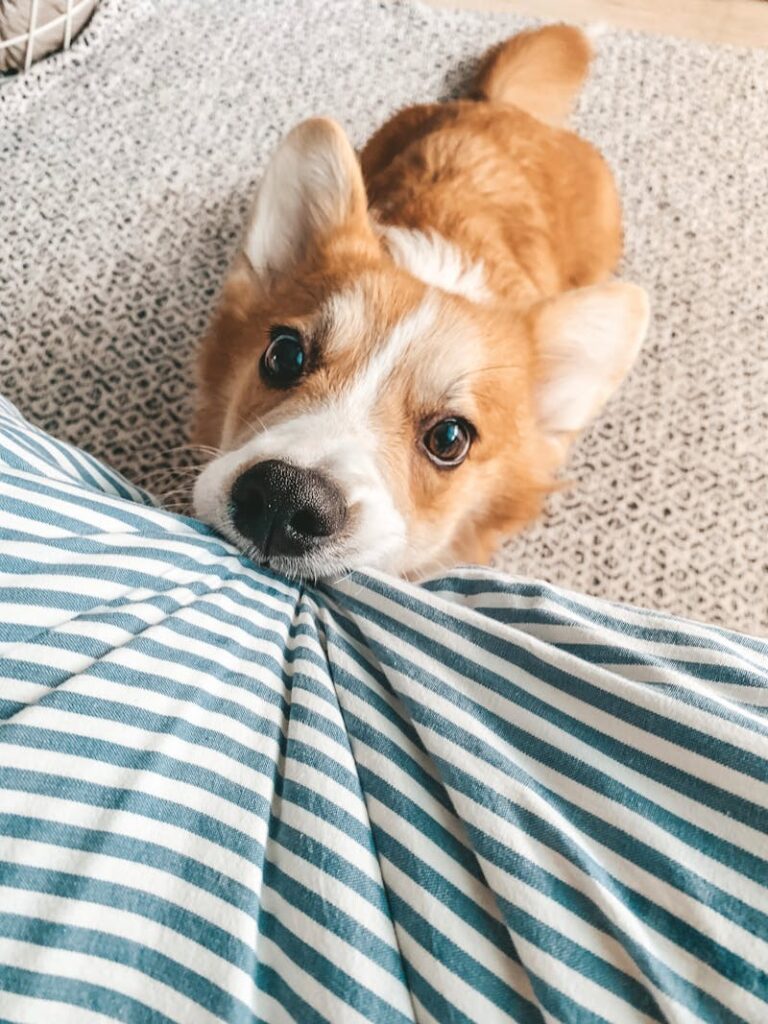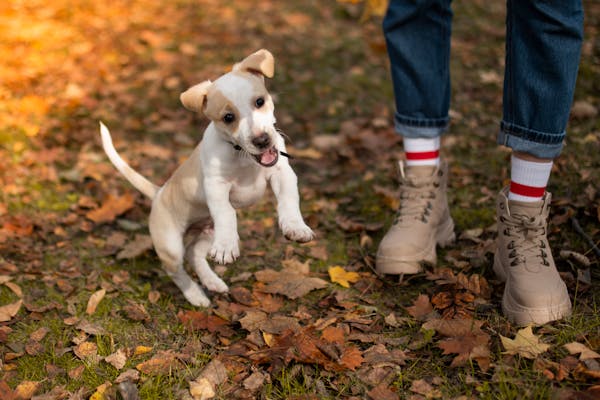Although it’s a thrilling trip, training a puppy is not without its difficulties. Biting and jumping rank highly among the most frequent complaints I receive from new paw-rents regarding puppies! Let’s first examine Why puppies bite and jump in the first place before discussing how to address this problem.

Biting is a prevalent problem, particularly since puppies nip and bite each other as they play. Those pointed puppy teeth, though typical, can hurt and irritate. Thankfully, there are efficient methods for teaching a puppy to avoid biting.
Like human babies, puppies also start their lives by exploring their surroundings with their lips. This is how they discover new textures, tastes, and forms, as well as how to move objects because they much rather use their mouths than their paws to do so.
Why Puppies Bite
Puppies undergo an excruciating teething process between the ages of 3 and 4 months, during which their 30 baby teeth begin to fall out and are progressively replaced by roughly 40 adult teeth. This is another reason why puppies bite so much. Your puppy will seek out chewing objects to help relieve the discomfort caused by these sharp teeth when they emerge from their gums. Puppies will typically chew, gnaw, and bite almost anything at this point to help them through this uncomfortable phase. Teething pain can frequently make your puppy agitated and constantly look for something to bite next.
Puppy biting is just another reason why they bite so much—they usually bite to start play with their siblings. During this time, dogs build a communication system that eventually results in the development of their bite inhibition. Biting inhibition-displaying puppies can control how hard they bite. Puppies who bite each other too hard usually cause the injured puppy to yap and quit playing. The guilty dog will learn not to bite as hard the next time in return.

In contrast, severe biting and nipping by your puppy may suggest overexertion or excessive activity. Like kids, puppies often get overstimulated and go into a biting frenzy when it’s time for a nap. Your puppy might be trying to tell you that they need to unwind and take a nap in their playpen or crate in this particular scenario.
How to Stop Your Puppy Biting:
- Redirect Early: If your puppy begins to bite, divert its focus to a chew toy or anything else more suitable. When biting is still modest in the early stages, this works wonderfully.
- Use Gentle Pressure: If your dog is biting, try gently moving its lip over its teeth to have it bite itself instead of you. You may teach your dog that biting causes pain by using this method.
- Recognize the Need for Rest: Your puppy may need to take a nap if it starts to act too rowdy. To help your dog relax and quit biting, put it in a playpen or crate.
Preventing Biting:
- Crate and Playpen Use: Using a playpen or kennel on a regular basis helps deter biting. Your puppy is less likely to become overstimulated and begin biting when it is in a supervised setting.
- Avoid Toys as a Distraction: Toys can deflect biting but use caution when selecting which toys to use. Steer clear of squeaky toys since these may incite greater biting. Choose sturdy chew toys instead, like a Kong or dental chew.
Determining Why Your Dog Jumps
Although it may seem adorable when your puppy is small, jumping up on you can rapidly become a nuisance as your pet gets older. To avoid this behaviour turning becoming a habit, it must be stopped as soon as possible.

While it may seem sweet at first when a dog jumps up, bites its lead, or misbehaves, it can soon get old and annoying. You should be teaching your dog the appropriate lessons to deter this unwanted conduct whether you are training them to walk in public or on a leash. You can learn how to stop your dog from jumping when walking on a lead by consulting a dog behaviour training handbook. Let’s examine a few of the causes behind your dog’s behaviour.
Being playful
Your dog may spring up and bound when out on a stroll if they are excited and full of energy. It’s understandable; going for a walk is exhilarating!
Wants you to interact with them
Some dogs have an unmistakable manner of saying hello as they jump up. Social dogs long for company, particularly after spending a significant amount of the day alone.
Needs your attention
Some dogs will stop at nothing to receive attention because they are so desperate for it. Unwanted behaviors are included in this. If giving them a stern but gentle reprimand signals that they have your attention, then so be it.
Anxiety
Some dogs become frightened and overstimulated, which is why they jump up and bite. Walking your dog exposes him to new stimuli, and he may feel the need to bite and jump to protect himself.
Tired and a bit cranky
Puppies who are overstimulated, exhausted, and grumpy tend to misbehave, leap, and bite more frequently.
Frustration
When they’re leashed and can’t go where they want to, some dogs become irate. With so many sights and smells to soak in while out and about, some canines are unable to handle their elevated emotions and overstimulation. As a result, while a dog goes out on a walk, they could bite and jump out of displeasure.
How to Stop Your Puppy from Jumping:
- Ignore and Step Away: When your dog jumps, step back and ignore the action. This teaches your dog that jumping is not a way to get praise or attention.
- Use a Knee Block: to teach your puppy not to leap on you. When the puppy collides with your knee, he will learn that jumping is painful.
- Crate and Playpen Time: It’s time for a vacation if your puppy starts to act overly demanding. Putting your dog in a playpen or crate will help it relax and stop jumping.
Keeping Puppies Off Furniture:
- No Furniture Rule: Enforcing the guideline to keep your dog off the furniture should begin right away. Say “No” with conviction when your dog attempts to leap onto the furniture, then put it back on the ground.
- Be Consistent: Maintaining consistency is essential. Your puppy will continue to jump on the furniture when it gets bigger if you let it do so now. Continue to firmly and patiently redirect this behaviour.
What Not to Do When Your Dog Jumps and Bites
- Teaching your dog to walk on a leash without jumping or biting might be tough if they feel pressured. You can teach your dog what to do if you are diligent and gentle with it.
- Do not admonish or shout at your dog.
- Yelling or scolding may likely enhance their eagerness and aggression.
To lessen excitement, use an unusual sound, such as a high-pitched whistle. Avoid making fast movements.
If you tug on your dog’s leash, grab them, or forcefully push them away, they may become more aggressive.
Even if their biting and jumping appear playful or eager, reacting angrily can quickly evolve into a protective and angry response. - Never punish your dog.
- Punishment-based methods don’t improve your relationship, and if your pet is acting out because they’re nervous, you’ll just make things worse. For some dogs, punishment still serves as a sort of attention.
- Dogs are unlikely to behave as you would like if they were afraid of you since you may smack them or punish them for bad behaviour. Either ignore their actions or try to reroute them.
The Importance of Patience and Persistence
Puppyhood is both an enjoyable and tough stage of life. It is your obligation as a dog owner to educate your pet acceptable behavior’s through patience and persistence. To preserve consistency, you might consider informing your family members about these standards!

Conclusion
Puppy ownership has several benefits, but it can also present many difficulties. Redirecting, decreasing, and getting rid of your puppy’s unwanted biting and nipping can be achieved in part by learning why your puppy is acting out and how to best meet his needs, giving him opportunities for enrichment and physical and mental stimulation, managing him and his surroundings as best you can, and setting him up for success through positive reinforcement training. Since there are always tasks to be completed, we might as well make the most of the journey itself!
FAQs
1. Why does my puppy bite? Puppies often bite as a way to explore their environment, relieve teething pain, or engage in play. It’s a natural behavior that can be redirected with proper training.
2. How can I stop my puppy from jumping on me? To prevent jumping, ignore the behavior by stepping back when your puppy jumps. You can also use a knee block technique or redirect their attention to a toy.
